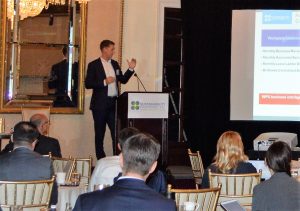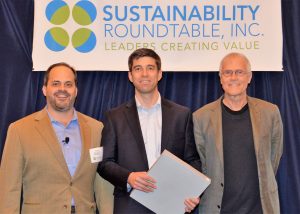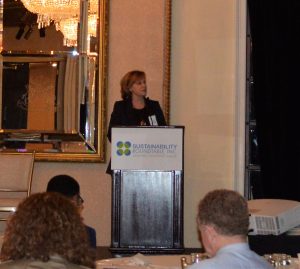This website uses cookies so that we can provide you with the best user experience possible. Cookie information is stored in your browser and performs functions such as recognising you when you return to our website and helping our team to understand which sections of the website you find most interesting and useful.
December 21, 2016
A Revolution Towards Sustainably Healthy Workplaces Portfolio-wide
Sustainability Roundtable, Inc.’s (SR Inc.’s) Summit for Sustainable Operations V, held at the St. Regis Hotel in Washington DC on December 7th & 8th, examined several topics relating to the overarching theme of “Regenerative Operations by 2030,” including portfolio-wide management best practices that companies are employing to turn this goal, which previously seemed too audacious even for industry leaders, into an achievable one. One such topic, which has captured increasing attention from Member-Clients in recent months and years, is the strategic and enduring value that Sustainably Healthy Workplaces can create for an enterprise.
Peter Crawley, Director of Research & Consulting at Sustainability Roundtable, Inc. framed the morning session on Sustainably Healthy Workplaces (SHW) by sharing key findings from work on SHW programs with SR Inc. member clients over the past year. He reminded attendees that successful programs should be focused on enhancing worker health, productivity and job satisfaction because typical personnel costs are 10x space costs and 100x energy costs. Therefore, improvements in worker productivity have direct and significant impacts on a company’s bottom-line and drive the business case for SHW.
This financial ratio also supports another key learning: successful SHW initiatives need to be human-centered in terms of design, implementation and outcomes. Initiatives that are primarily driven, for example, by technology or rent savings, may actually have adverse financial and organizational consequences if they negatively impact worker productivity, health or job satisfaction.

Understanding and leveraging the impact of SHW programs on worker productivity also moves the Corporate Real Estate (CRE) function from treatment by the C-suite as a “cost center” to that of a “value creator”. Peter pointed out that Millennials are approaching 50% of the workforce and have the skill sets that companies need to be competitive. Attracting and retaining Millennials requires healthy workplaces and strong corporate sustainability goals and programs.
Andrew Green, Manager, Environmental Sustainability Office, Capital One
SHW is a sub-frame of enterprise-wide sustainability and the two strategies should be aligned. It follows, therefore, that effective SHW programs require effective cross-departmental teams, such as collaborations between Human Resources, Technology, Space Planning and Sustainability. Andrew Green, Manager of the Environmental Sustainability Office at Capital One, focused his presentation on best practice governance protocols to assure cross-departmental collaboration and effectiveness. He recommended alignment of organizational structures and reporting hierarchies, as well as goal and budgeting alignments. He also recommended formalizing regular interdepartmental meetings and open data and credit sharing.

Hakon Mattson, Director, CRE Sustainability, Anthem, Inc.
Presenter Hakon Mattson shared recommendations on identifying metrics and developing scorecards for an effective portfolio-wide SHW program. Working with SR Inc., he created a checklist of 8 areas to baseline a portfolio of buildings for worker health impacts: Air, Comfort, Fitness, Light, Mind, Nourishment and Security. He pointed out that relevant data could be sourced from CRE, Human Resources, IT and other departments, but that it is a challenge to precisely correlate workplace environmental conditions with specific health outcomes.
Deidre Buzzetto, Director of International Real Estate Workplace Solutions, Lenovo
Deidre Buzzetto shared her approach to capturing relevant SHW data and integrating it into workplace design guidelines. She recommended multiple research methods, including occupant surveys, behavioral observation by experts, and real time space monitoring and utilization analysis via wireless technologies. Deidre shared her findings that building healthy workplaces, characterized by open floor plans and strategic combinations of private and shared spaces aimed at increasing collaboration and productivity, have reduced overall cost of occupancy per employee.

Conclusion
Looking to the future, all the speakers pointed-out the need for more research and targeted data collection related to measuring the impacts of healthy work environments on worker productivity and job satisfaction. Advances in workplace IOT technologies, including wearable devices, supply great promise for better data and new metrics (such as Health Performance Indicators) to clarify the impacts of workplace environments on worker health and productivity.
SR Inc looks forward to working with Member-Clients in the New Year to develop, deepen and design the business case for SHW in a manner that can be configured for any industry, market or building type to continue empowering our Member-Clients’ impressive, human-focused leadership in sustainability as we work together to help define and achieve enduring leadership in corporate real estate and operations globally.
The slide presentations from this session can be found on SR Inc’s Digital Library here: A Revolution Towards Sustainably Healthy Workplaces Portfolio-wide
Select Relevant SBER Executive Guidance & Tools:
- Member Executive Tools:
- Member Briefings:
- Member Advisories:
- Member SBER Full Reports:
- 2016 Symposia Presentations:
 Peter Crawley, Director of Research & Consulting at SR Inc since January 2015, has led at the intersection of strategic consulting, real estate and sustainability for more than 15 years, serving as the principal advisor to top real estate owners and scores of operating companies. Peter has helped the executive teams at these enterprises develop and implement highly profitable Sustainability Strategies. Prior to joining SR Inc, Peter served as the Director of Sustainability Services at the environmental engineering firm EBI Consulting, as well as Director of the Sustainable Business Leader Program of MA. He has also taught on Sustainability, Leadership, and Corporate Social Responsibility as an adjunct professor at Boston College’s Carroll School of Business.
Peter Crawley, Director of Research & Consulting at SR Inc since January 2015, has led at the intersection of strategic consulting, real estate and sustainability for more than 15 years, serving as the principal advisor to top real estate owners and scores of operating companies. Peter has helped the executive teams at these enterprises develop and implement highly profitable Sustainability Strategies. Prior to joining SR Inc, Peter served as the Director of Sustainability Services at the environmental engineering firm EBI Consulting, as well as Director of the Sustainable Business Leader Program of MA. He has also taught on Sustainability, Leadership, and Corporate Social Responsibility as an adjunct professor at Boston College’s Carroll School of Business.
Peter is LEED accredited and has deep experience working on energy efficiency issues, product life cycle improvements, and greenhouse gas measurement, reduction, and reporting. He has worked on numerous LEED certification and high-performance building projects, and designed and implemented company-wide behavioral change programs to advance sustainability goals and enhance employee engagement.
Peter received his BA from Amherst College, his MS in Real Estate from Columbia University and his MA in Sustainability & Environmental Management from Harvard University.

